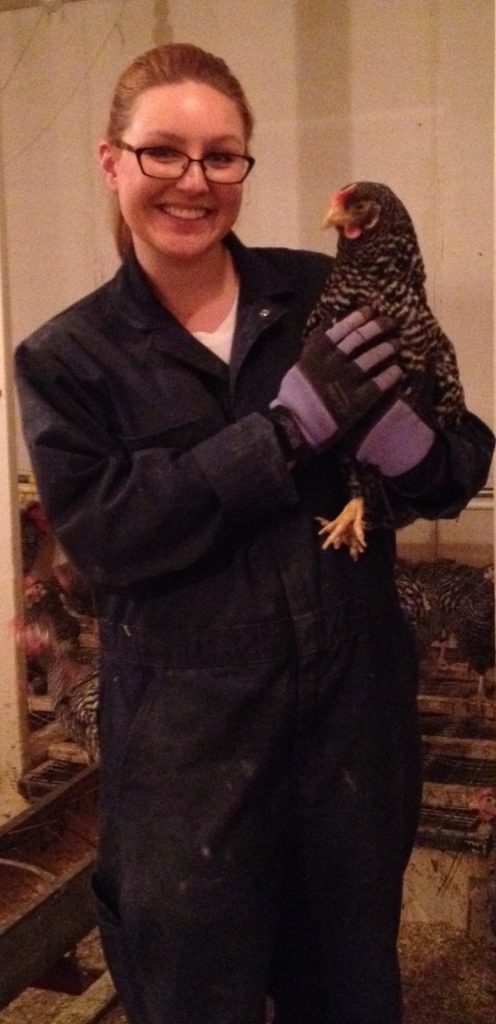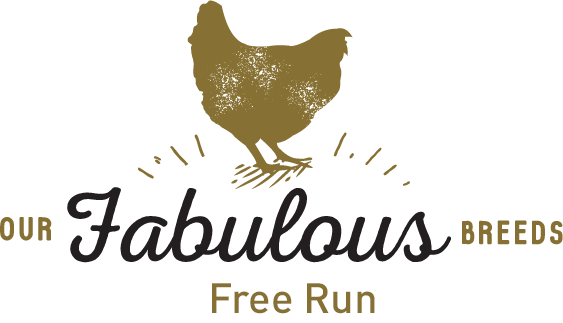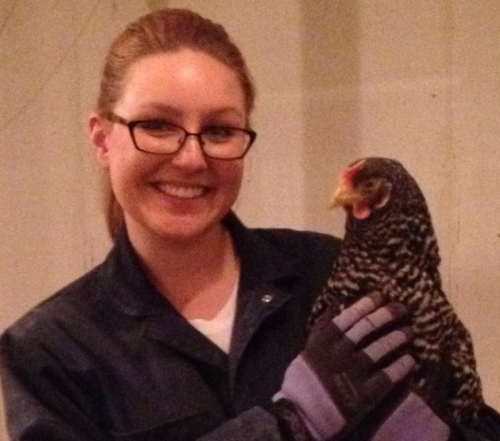I’d like to introduce everyone to our newest member on staff at the Poultry Research Centre. Her name is Rachelle and she loves chickens, especially our heritage breeds!
As she interacts with the chickens every day, she has hands-on experience and stories to share of our beloved girls and guys.
So how does a city girl become interested in working with chickens? We asked her a few questions to help us understand how she ended up working here at the Poultry Research Centre.

Amber: May we ask how is it that you got yourself into this type of work?
Rachelle: Fluke! I was taking my Bachelor of Science in Biological Sciences at the University of Alberta, but I had no idea of where I wanted to go with my career. By chance, I had previously taken a basic animal science course that I did quite well in and enjoyed thoroughly, so I switched into an agriculture minor. One of the requirements to receive an agriculture minor is to take the “Principles of Animal Agriculture” [Animal Science 200] course. It was in this course that I realized how much agriculture excited and inspired me, which gave me the drive to learn more about farming.
Amber: You mentioned this course gave you the drive to learn more – what did you find fascinating about this course? Would you recommend people to take this course?
Rachelle: It’s hard to pinpoint what fascinated me the most about this course because it wasn’t like any other course I took in university. The ANSC 200 course is based on the principle of free-range learning. Free-range learning is different than traditional learning as it guides you to ask questions that you want answers to, discover those answers, and then teach those answers to your peers rather than read and regurgitate information during an exam. On top of that, the course has a very hands-on lab component that introduces you to agriculture directly from the perspective of a farmer. What I mean is, you have students who are actually going to farms and seeing cows and chickens up close and personal. For someone born and raised in the city, that’s a big deal. Not to mention, Dr. Martin Zuidhof and Dr. Frank Robinson, the professors of the course, encouraged me to ask questions from the basic to the complex and didn’t make me feel less intelligent because I didn’t know what the answer was. Also, both Zuidhof and Robinson are major chicken fanatics. When I witnessed how much poultry excited them, it made me excited and intrigued me to learn more about chickens. The combination of exploratory learning and passion for poultry really showed me that I wanted to become involved with chickens. And anyways, I’ve always loved birds – I guess you could say that all my “chicks” were being lined up in a row, ha ha.
It’s funny that you asked if I would recommend this course to people – I already have! In the most cliché way possible, this course changed my life. I want that to happen to everyone who’s a little lost with their direction. Even if it’s not that specific course that changes their life, I want people to have a basic understanding of how modern day agriculture works.
Amber: It seems like this course shaped a lot of your ideas, can you tell us how you became involved with the Poultry Research Centre (PRC)?
Rachelle: During the last year of my degree, I took an animal behaviour course taught by Dr. Clover Bench, the University of Alberta ethology [science of animal behaviour] professor, which began my experience with animal behaviour research. Bench made ethology exciting and taught me how useful and applicable animal behaviour is in agriculture. Simultaneously, I was asked by my teaching assistant from the ANSC 200 course – we were still in touch – if I wanted to volunteer to become involved with her masters research in animal behaviour. Graciously, I accepted her offer. The research I was involved in was observing broiler breeders at the Poultry Research Centre. This experience helped me realize that I really loved being with chickens and could work with poultry as a potential career.
By chance, a position opened up to be a full time animal technician at the PRC during the last month of my BSc . I applied and was offered the position – I accepted, and here I am!
Amber: You went from observing chickens to receiving a full time position at the PRC – what a leap! What exactly do you do here?
Rachelle: Everyone here at the PRC is responsible for a specific barn, depending on what studies are occurring at that time. My principle responsibility is maintaining the barn with the heritage breeds. Everyday, I feed the birds, collect eggs, clean the barn, repair any necessary repairs, and ensure proper flock health. I absolutely love it! Being around the birds makes me ecstatic, I think they’re adorable and exciting. Watching and caring for chickens isn’t just something I do, it’s something that I genuinely enjoy.
Amber: Do the personalities of the breeds differ in any way?
Rachelle: Yes, yes, and yes. It still surprises me how much the same species of animal can vary by breed. I guess if you think about it, chicken breeds are just like dog breeds – a Chihuahua does NOT have the same personality as a bull mastiff. The Light Sussex, Dark Brown Leghorns, and New Hampshire are all very broody. What I mean by broody is their mothering traits, such as nesting and egg protection, makes them tricky to handle. They don’t like their eggs collected at all – even when they know it’s going to happen [eggs are collected three times a day]! The 1957’s and White Leghorns are very flighty. If they could talk, they’re the kind of breeds that would be yelling “The sky is falling! The sky is falling!” Lastly, the Plymouth Barred Rock, Rhode Island Reds are quite docile and curious. They’re not scared to stick their head in your space just to see what you’re doing.
Amber: Do you have a favourite Chicken?
Rachelle: If you mean by breed, I would probably have to choose Rhode Island Reds. If you mean specific chicken though… then yes I do have a favourite. Actually I have two – and I’ve named them! They’re both Plymouth Barred Rocks. My favourite hen, Bertha, is a social girl who waits for me every day on her nest box perch to pick her up. My favourite rooster, Jack, is a small guy who will jump on my lap and cluck quietly if I happen to take a seat in the pen while observing flock health.
Amber: What is one thing you have learned so far about chickens that you did not know before?
Rachelle: Dropping eggs is a regular occurrence on the job. It’s not something that I want to happen, but when you collect over a thousand eggs a day it’s hard to be completely perfect. If I accidentally drop an egg in a pen, the chickens take the mess into their own wings and clean it up faster than I can bend down to even try to pick up my mistake. Yes that’s right, chickens will eat their own broken eggs! And rightfully so. If the chicken was in the wild, they would not want to have broken eggs around their territory because it attracts predators. Just because we raise the girls indoors doesn’t mean that innate behaviour disappears.




